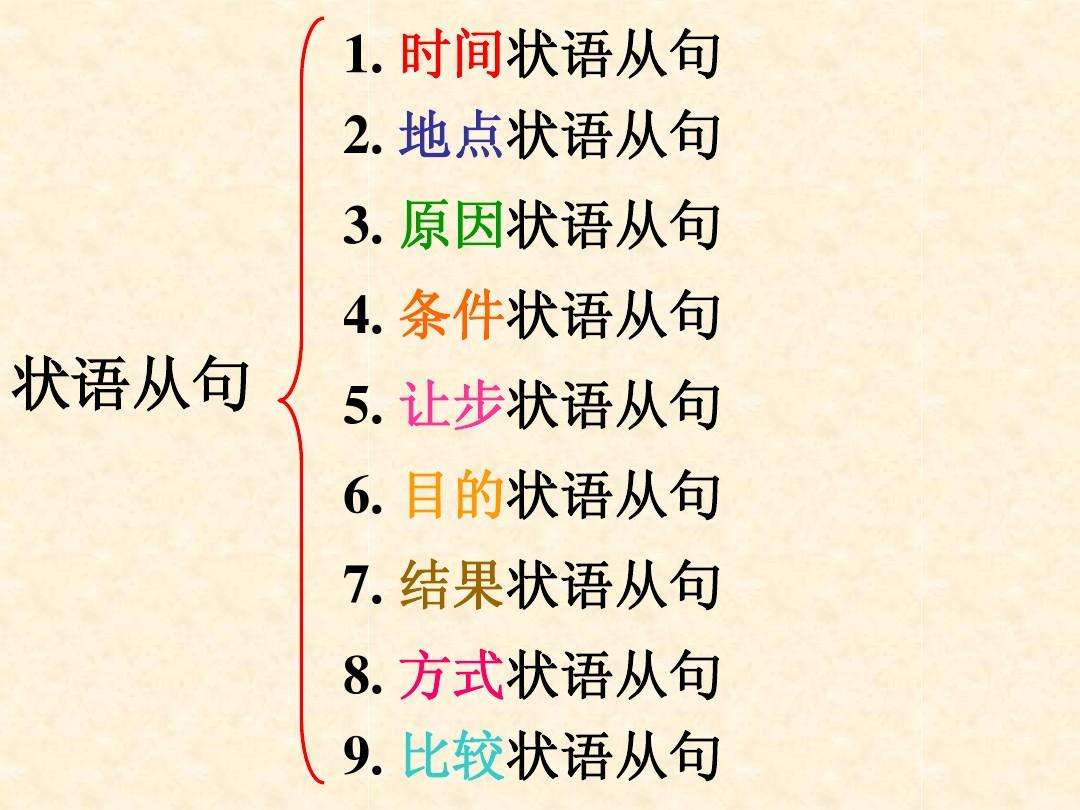请看下面的句子:
1.He works hard.
2.He’s in need of money.
He works hard because he’s in need of money.他勤奋工作,因为他需要钱。
1.2 都是完整独立的简单句,两者都有因果关系。缺钱是工作的原因,于是用表示原因的连接词because加在2前。
状语从句:状语从句主要用来修饰主句或主句的谓语。一般可分为九大类分别表示时间、地点、原因、目的、结果、条件、让步、比较和方式
考点:状语从句的关键是要掌握引导不同状语从句的常用连接词和特殊的连接词即考点。
一、时间状语从句

1. 时间状语从句中常用的引导词
释义 | 特点 | 从句的谓语v | 动作 | |
when | 当……的时候 | 时间点/时间段 | 非延续性v/延续性v | 动作可先后发生,也可同时发生 |
while | 在……的期间 | 时间段 | 延续v | 动作同时发生 |
as | 一边……一边…… 与……同时 | 两个动作同时发生/淡化时间 | ||
before | 在……之前 | 时间点 | 主句动作发生在从句动作之前,从句不用否定式 | |
after | 在……之后 | 时间点 | 主句动作发生在从句动作之后 | |
since | 自从 | 若时间从该动作发生时算起,用非延续性v | 若时间从该动作或结束时算起,用延续性v | |
by the time | 到……为止 | 延续性v | ||
until/till | 直到 | 主句谓语延续性v,主句常用肯定形式 | 主句谓语非延续性v,主句常用否定形式 | |
as soon as | 一……就…… | 强调两个动作紧接着发生 |
2. 注意:when, while和as的区别

(1) when引导的从句的谓语动词可以是延续性的动词,又可以是瞬时动词。并且when有时表示"就在那时"。
When she came in, I was eating. 她进来时,我在吃饭。(瞬时动词)
When I lived in the countryside, I used to carry some water for him.当的住在农村时,我常常为他担水。(延续性的动词)
We were about to leave when he came in.我们就要离开,就在那时他进来了。
(2) While引导的从句的谓语动作必须是延续性的,并强调主句和从句的动作同时发生(或者相对应)。并且while有时还可以表示对比。例如:
While my wife was reading the newspaper, I was watching TV. (was reading是延续性的动词,was reading和was watching同时发生)
I like playing football while you like playing basketball.我喜欢踢足球,而你喜欢打篮球。(对比)
(3) As表示"一边…一边",as引导的动作是延续性的动作,一般用于主句和从句动作同时发生;as也可以强调"一先一后。
We always sing as we walk.我们总是边走边唱。(as表示"一边…一边")
As we was going out, it began to snow.当我们出门时,开始下雪了。(as强调句中两个动作紧接着先后发生,而不强调开始下雪的特定时间)
3. 状语从句与主句的时态问题
(1)由when、while引导的时间状语从句的时态: (主过从过)
主句(过去进行时)+when +从句(一般过去)
主句(一般过去时)+when +从句(过去进行时)
主句(一般过去时)+while +从句(过去进行时)
主句(过去进行时)+while +从句(过去进行时)
注意:看动词为短暂性动词用一般过去时,动词为延续性动词则用过去进行时。
Mother was cooking supper when I got home yesterday.
Last Sunday I met Lin Hong when I was walking in the street.
When the students were having a meeting, the teacher came in.
While Han Meimei was sweeping the floor, Lucy was carrying water.
(2)由before和after引导的时间状语从句的时态:
Before从句动作发生在主句之后。
After从句动作发生在主句之前。
It will be four days before they come back.
他们要过四天才能回来。
My father had left for Canada just before the letter arrived.
我父亲恰好在信到之前去加拿大了。
After you think it over, please let me know what you decide.
你仔细考虑过以后,告诉我你是怎样决定的。
After we had finished the work, we went home.
完成工作之后,我们回家了。(从句用过去完成时,主句用一般过去时)
(3) since引导的时间状语从句的时态:
表示自过去的一个起点时间到目前(说话时间)为止的一段持续时间。主句一般用现在完成时,从句用一般过去时。但在It is +时间+since从句的句型中,主句多用一般现在时。
It is four years since my sister lived in Beijing. 我妹妹不在北京住有四年了。
Mr Green has taught in that school since he came to China three years ago.
自格林先生来中国以来,他就在这所学校教书。
(4) by the time所在句子的主句应用现在完成时或过去完成时
By the time he gets there, his father has already gone.
他到家的时候,他爸爸已经走了。
By the time I got to school, the class had already begun.
我到校时,已经开始上课了。
条件状语从句

在英文中,条件是指某一件事情实现之后(状语从句中的动作),其它事情(主句中的动作)才能发生。连接词主要有:
if如果
unless除非,若不,除非在……的时候
as/so long as只要, 等。
1.If it doesn't rain tomorrow, we will go hiking.
如果明天不下雨, 我们就去远足。
2.You will get good grades if you study hard.
如果你努力学习,就会取得好成绩。
3.You will be late unless you leave immediately.
如果你不马上走,你将会迟到的.(=If you don't leave immediately, you will be late.)
I don't care so [as] long as she lets me be with her son.
只要她让我和她儿子在一起,我不在乎。
用条件状语从句时要注意:从句要用一般现在时,主句是一般将来时。
地点状语从句
引导地点状语从句的连词有where(在…..地方),wherever(无论哪里,在任何地方),everywhere(每一…...地方,到处),anywhere(任何地方),where总是放在主句后,绝不提前。
Where I live there are plenty of trees.
我住的地方树很多。
Wherever I am I will be thinking of you.
不管我在哪里我都会想到你。
where引导的定语从句与状语从句区别:
Go back where you came from.你从何处来到何处去。(地点状语从句)
Go back to the place where you came from.回到你来的那个村子里去。(定语从句)
原因状语从句
由连词because, since, as引导(语气:because>since>as), 也可由for, now that 等词引导
1.I didn't go to school yesterday because I was ill.
我昨天没去上学,因为我生病了。
2. Since everybody is here, let's begin our meeting.
既然大家都来了, 让我们开始开会吧.
3. As you are in poor health, you should not stay up late.
既然你身体不好, 你就不该熬夜.
4.I asked her to stay to tea, for I had something to tell her.
我请她留下来喝茶,因为我有事要告诉她.
5. Now that the children have cleaned up, you can let them go.
孩子们已经梳洗了,你可以让他们走了。
难点--because , since , as , for,辨析
1) because语势最强,用来说明人所不知的原因,回答why提出的问题。当原因是显而易见的或已为人们所知,就用as或 since。语气:because>since>as
I didn't go, because I was afraid.
Since / As the weather is so bad, we have to delay our journey.
2) 由because引导的从句如果放在句末,且前面有逗号,则可以用for来代替。但如果不是说明直接原因,而是多种情况加以推断,就只能用for。
He is absent today, because / for he is ill.
He must be ill, for he is absent today.
